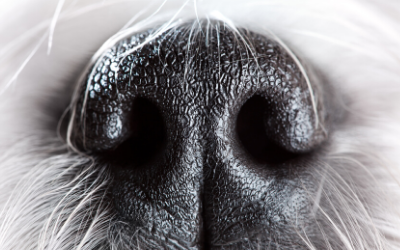
Scent detection dogs, or sniffer dogs, can be trained to sniff out many different things including contraband drugs, explosives, missing people, and disease. With up to 300 million smell receptors (humans have just 6 million), dogs’ “sniffers” are much more sensitive than humans—dogs can detect scents at concentrations of one part per trillion!
Dogs have successfully been trained to detect diseases such as cancer (e.g., breast, ovarian, lung, bladder, stomach, liver, prostate, and skin cancer), diabetes, malaria, tuberculosis, and Parkinson’s disease through scent.
They’ve also been trained to detect superbugs like Clostridium difficile (C. diff). Researchers have found that where these dogs work, the rates of C. diff are quite diminished. And dogs have been successfully trained as service dogs to detect when a person is about to have a narcolepsy attack. Biodetection dogs can detect low concentrations of volatile organic compounds (VOCs) associated with disease such as cancer, bacterial infections, malaria, and Parkinson’s Disease. These VOCs are present in human blood, saliva, urine, or the breath.
Now dogs are being trained to sniff out COVID-19.
Researchers at the University of Pennsylvania’s School of Veterinary Medicine (Penn Vet) are attempting to train dogs to learn the odour associated with COVID-19. Over the course of three weeks, eight dogs will be exposed to COVID-19 positive urine and saliva samples through a process called odor imprinting. Once these dogs have learned the odor associated with COVID-19, the researchers will see if the dogs can identify COVID-19 positive people. Since scent detection dogs can detect very low concentrations of VOCs present in blood, urine, and on the breath, they may be able to detect COVID-19 in people.
The researchers hope to have dogs ready for preliminary screening of humans in early July.
This is more than just an interesting concept—it could prove to be valuable in helping to reduce community spread of COVID-19. Biodetection dogs could be used at airports, ports of entry, or other border crossings to prevent asymptomatic carriers of the virus from bringing it into a community.
If all goes well, dogs could be used to detect COVID-19 in hospitals, or business environments where testing is challenging.
We’re all in this together – even the dogs!
